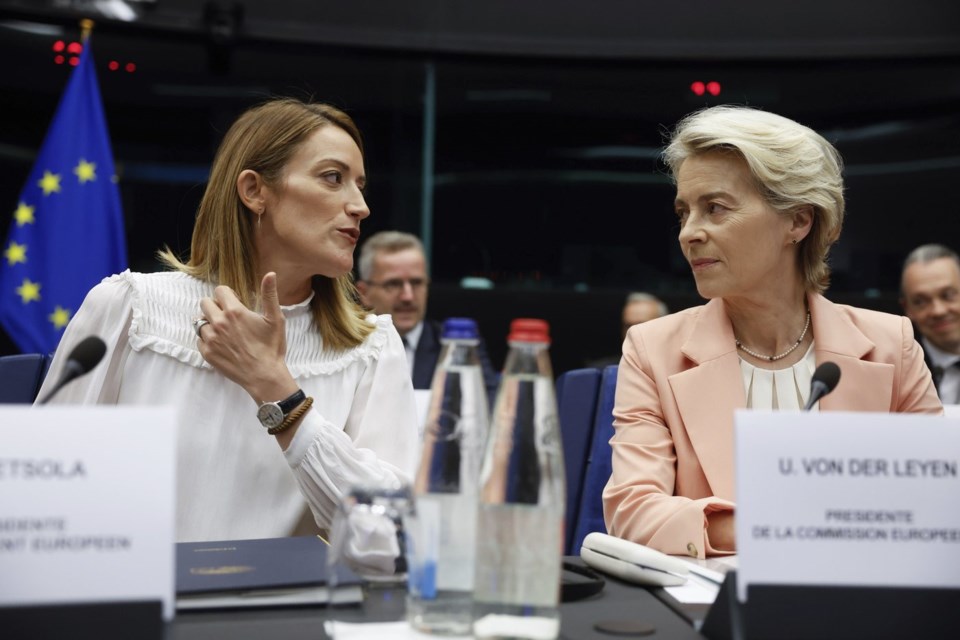BRUSSELS (AP) — European Union chief Ursula von der Leyen put women in many of the top roles on her new team for her on Tuesday, despite the reluctance of many EU member states to give in to her demand for gender parity.
Von der Leyen named only two men in her top echelon with four women as vice presidents, including Kaja Kallas as foreign policy chief. Kallas was already agreed on by government leaders.
Von der Leyen on Tuesday added Spanish Socialist Teresa Ribera to lead the green transition, along with Ribera also becoming the competition czar. Finland's Henna Virkkunen was her pick for rule of law and digital leader, and Roxana Minzatu of Romania for social affairs leader.
The appointments of the Commission team — which veers to the right after the June elections saw a surge of far-right parties — still have to be confirmed.
The appointment as executive vice president of Raffaele Fitto of Italian Prime Minister Giorgia Meloni's hard right Brothers of Italy party is bound to cause controversy during the parliamentary confirmation hearing in the coming weeks.
Also on Tuesday, von der Leyen gave French Foreign Minister Stephane Sejourne the industrial portfolio, after French for allegedly “questionable governance” on Monday,
It left France with a strong voice in the Commission, and many saw Breton's shock resignation more as a removal by von der Leyen of one of her most open internal critics after exerting pressure on French authorities.
Compounding such problems was the defiance of many of the 27 member states as von der Leyen struggled to get anywhere close to — they staunchly refused to give her a choice between a male and a female candidate.
She said that originally, EU nations only proposed 22% female candidates before she started to push for more.
“So I worked with the member states and we were able to improve the balance to 40% women and 60% men. And it shows that — as much as we have achieved — there is still so much more work to do,” von der Leyen said.
If she could not get full gender parity in numbers, von der Leyen made sure they were more than well represented in the top jobs.
After days of secret talks with individual European governments about their picks, von der Leyen huddled with the leaders of the political groups at the European Parliament in Strasbourg, France, to discuss the makeup of her college before making the final announcement.
Now attention will center on the hearings in the European Parliament, where each candidate can be rejected to force a member state to put another candidate forward.
All eyes are expected to be on Fitto, with some already criticizing his appointment.
Greens lawmaker Rasmus Andresen said it was “completely incomprehensible” to name a representative of a far-right party, to the post of executive vice president of the Commission. “Can an anti-European manage EU funds,” Andresen asked.
“For the first time, our European executive will have among its leaders, someone who comes from the far right,” said Manon Aubry, the leader of The Left group. “It’s without precedent.”
However, von der Leyen said the Commission team had to reflect Italy's weight as a founding member and major economy.
"I think the balance is also very well kept,” said von der Leyen, who has long sought to keep Meloni, whose political roots are steeped deep in the extreme right, close once she became prime minister in 2022.
Meloni welcomed Fitto's appointment to a high-ranking position, calling it “an important recognition that confirms the newfound central role of our nation in the EU."
"Italy is finally back as a protagonist in Europe,” Meloni said.
Even if the Commission's makeup has hardly become the talk of bar rooms or barber shops across the vast EU of 450 million people, it has enthralled the upper echelons of politics and bureaucracy, as they sought to boost one candidate or undermine another.
The Commission proposes legislation for the EU’s 27 member countries and ensures that the rules governing the world’s biggest trading bloc are respected. It’s made up of a College of Commissioners with a range of portfolios similar to those of government ministers, including agriculture, economic, competition, security and migration policy.
The Commission is to start work on Nov. 1, but speculation is rife that it might not get down to business before January.
Raf Casert, The Associated Press



